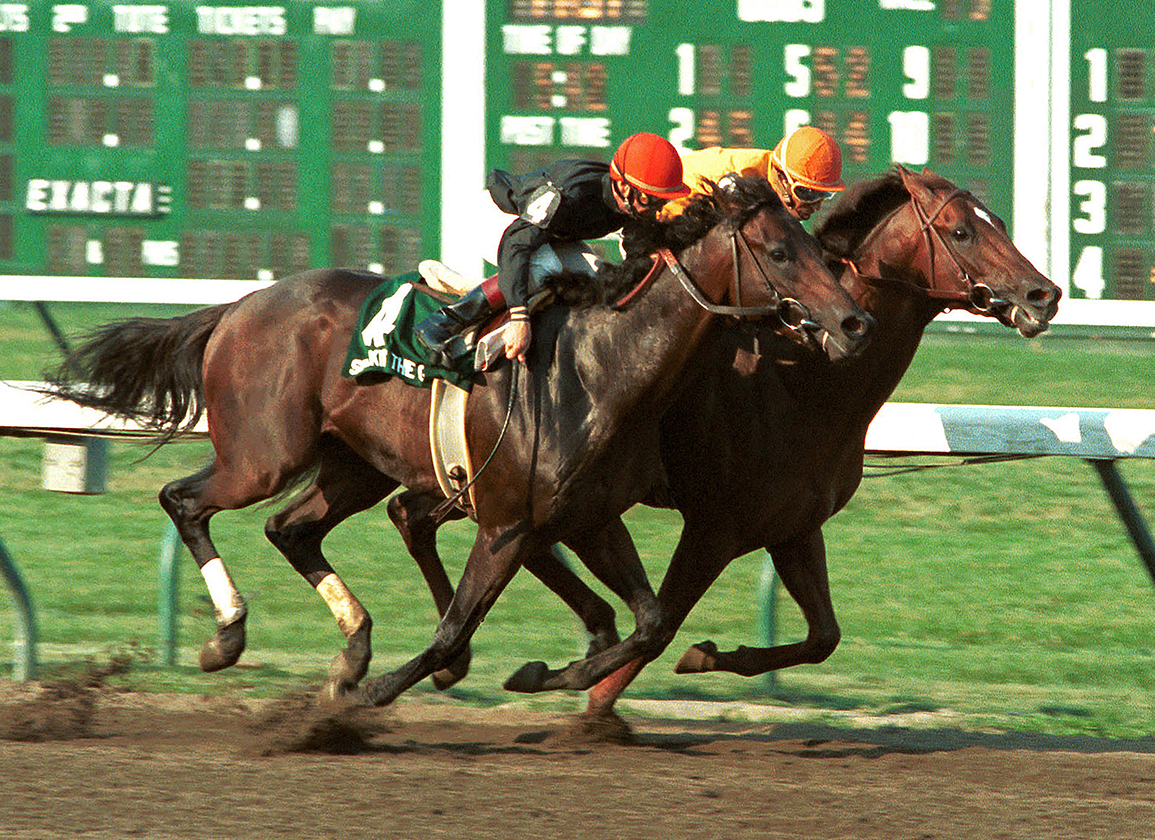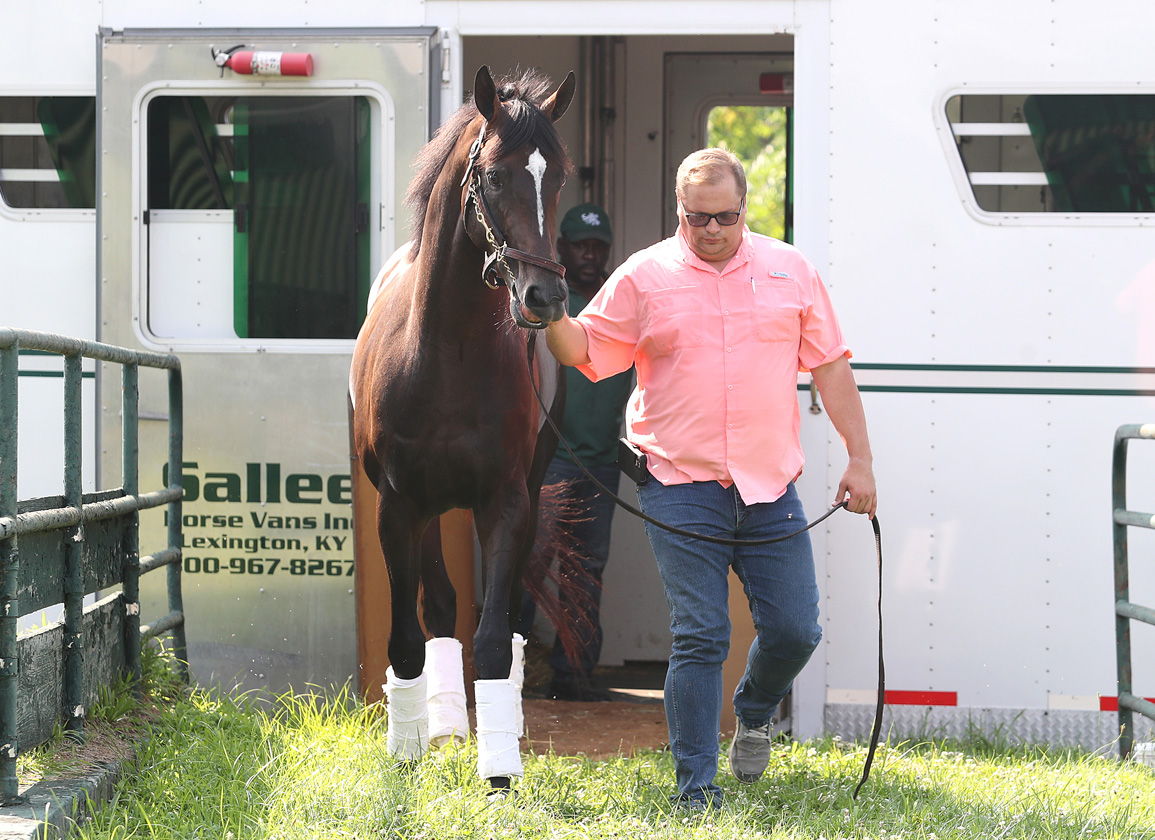So the big question is whether the out-of-town jocks, in the heat of a $1-million battle for the GI TVG.com Haskell S., can master the instinct to reach for the whip?
If any lifelong flagellants are anxious of their self-discipline, then they need only play back the 1988 running and remind themselves how Laffit Pincay, Jr. coaxed Forty Niner home, in withering heat, by a nose from Seeking the Gold. The whip is unsheathed, for sure, but so seamlessly with the horse's own efforts that the overall effect is like watching St. Francis of Assisi helping a fledgling back into its nest.
If only wider standards of horsemanship had maintained similar levels of empathy, then our house might never have become so divided against itself. As it stands, any hope that people might someday look back at Saturday's race after an equivalent interval of years may depend on the outcome of the experiment being boldly embraced this year, in defiance of some aggressive lobbying, by the New Jersey Racing Commission.
Like it or not, a first Grade I race without recourse to the whip feels like a big moment in the story of the American Turf. Our community has to remember two things. One is that we tend to be inured to the shock experienced by the layman who comes fresh to the ugly coercions of cruder riders. And the other, closely related, is that public policy in these matters will always be driven by mass perception, rather than any informed mitigations grasped by those inside the business. As one leading driver has wisely acknowledged of harness racing: “It doesn't matter if it's real or perceived. In our game, once it's perceived, it becomes real.”

Forty Niner prevails in the 1988 Haskell | Equi-Photo
As it happens, pretty much the same might be said of the damage done to our sport by the charges against the Derby winner, which loom over the Haskell even in the absence of a trainer who last year won it for a record ninth time. For these leave the Derby runner-up Mandaloun (Into Mischief) striving awkwardly to live up to his potential promotion, and the burden of the accompanying asterisk; while Following Sea (Runhappy) has meanwhile defected from Bob Baffert's barn after Spendthrift “hit the pause button” on their association.
Whatever the ultimate determination of due process, in this particular instance, overall it seems fair to ask Baffert to understand that you can't push regulatory boundaries without doing the same to public confidence. He would not be the only trainer to view a veterinary toolbox rather as many jockeys do the whip, as somehow combining their own competitive interests with those of the horse. (Precepts of health and safety certainly seem usefully flexible.) But it is a wider failure to deal adequately with more flagrant offenders, whether with the crop or pharmaceuticals, that has only encouraged the wider world in judgements, however superficial, that authentically menace our sport's survival.
Races like this one, as cherished staging posts in our calendar, remind us that we are only ever passing a baton from one hand to the next. Pincay and Forty Niner are part of Monmouth Park heritage–and so, too, is the Virgil “Buddy” Raines Distinguished Achievement Award conferred on Baffert in 2015 for his commitment to the Haskell. Devised to salute integrity and professionalism in the service of New Jersey racing, this is exactly the kind of honor that should reinforce in its recipient an obligation to take no risks with the reputation of his community.
Buddy Raines, after all, was the incarnation of the fine character that can be drawn out of humankind by the Thoroughbred. His 80-year Turf career began when a trainer passing through rural Illinois was given hospitality by his parents. Gazing at so many hungry brothers seated round the table, the guest wistfully remarked that he could do with a strong young helper to help around the barn. “Well, hell, take that one,” said Mr. Raines, pointing at Virgil.
Buddy Raines came to mind this week on the passing of Hall of Fame jockey John L. Rotz, with whom he shared a career pinnacle in the 1962 GI Preakness S. won by Greek Money. Rotz had an exemplary career, working his way up from hotwalker to Midwest fairs to the George Woolf Memorial Award, and the manners that earned him the soubriquet “Gentleman John” also extended to his mounts, gaining him a particular reputation for the management of difficult temperaments.
Greek Money's Preakness is remembered best for Joseph di Paola's iconic photograph of Manny Ycaza on Ridan apparently trying to elbow Rotz as their tumultuous stretch duel neared the line. (Nor was Ycaza done, then having the temerity to lodge an objection for interference.) Rotz later absolved his rival of any contact, but also wondered whether Ycaza might have won had he confined himself to riding his own horse, rather than trying to control both.
Rotz rode enough good horses virtually to guarantee that you'll find his fingerprints somewhere behind the Haskell winner. In Mandaloun himself, for instance, the second dam of his sire is by Stop the Music, famously awarded the Champagne S. after Rotz took exception to a brief deviation in Secretariat's march to greatness; while Midnight Bourbon (Tiznow) is by a grandson of Relaunch, whose sire In Reality and damsire The Axe II were both partnered by Rotz.

Midnight Bourbon arriving Thursday at Monmouth | Bill Denver/Equi-Photo
It's a fascinating race, pitching three Classic runners-up against the flagship of Runhappy's brilliant revival after a disappointing freshman campaign. Trying a second turn against elite opposition will certainly tell us what substance may underpin the dazzling style of Following Sea, but many neutrals will be hoping for a merited Grade I success for Hot Rod Charlie (Oxbow). As has been widely celebrated, “Chuck” set the fastest opening quarter in the long history of the GI Belmont S., and a :46.49 half bettered only by Secretariat, yet retained the reserves to pull 11 lengths clear of the rest in harrying crop leader Essential Quality (Tapit) all the way down the stretch. Perhaps the sport might have been spared much of its present embarrassment if he had been ridden with similar aggression in the Derby, instead of gifting control to Medina Spirit (Protonico), but the notion that he can eyeball a rival even better without blinkers (as well as without the whip) looks an intriguing gamble.
However things play out between them, the fact that all three of the Triple Crown protagonists converging here completed their springtime preparations in the GII Louisiana Derby means that there is already one guaranteed winner. And that's the Fair Grounds management, for having the enterprise to stretch out a race that has come to seem too close to the first Saturday in May–too close for the trainers of today, at any rate–to permit equivalent grounding with another rehearsal in between.
We credit much of “Chuck's pluck” to Oxbow, whose ardent Triple Crown campaign so shames the current crop–not one of whom contested all three legs this time round. True, the Mid-Atlantic stalwart Raines chose to sit out the Derby to bring Greek Money relatively fresh to the Preakness, but that didn't stop him running in the local prep race the previous Saturday. Who knows? Even as a son of Oxbow, Chuck might not have been able to dig so deep in the Belmont had he also contested the Preakness. But he's certainly made of the right stuff.
That, and an ownership team that transcends generations, gives us plenty of optimism for the future of the game. A precious commodity, right now, but this is a race (and racetrack) that has always engaged dynamically with challenges. That's how we can try a Haskell without whips; a Haskell with a $1-million bonus backed by the operators of a pioneering venture in fixed-odds wagering; a Haskell headlining a meet of boosted purses and turnstiles clicking cheerfully once again.
So, if it can also be a Haskell that honors the memory of “Gentleman” John Rotz, and indeed that of Buddy Raines, then people out there might once again start to accept our claims that we treat every horse right–not because of rules and regulations, nor because of cosmetics, but because it wouldn't even occur to us to do anything else.

The post This Side Up: Haskell Throwbacks to the Future appeared first on TDN | Thoroughbred Daily News | Horse Racing News, Results and Video | Thoroughbred Breeding and Auctions.
Source of original post


